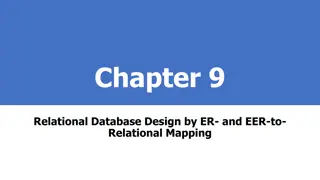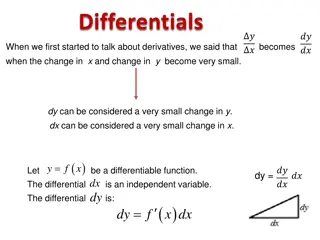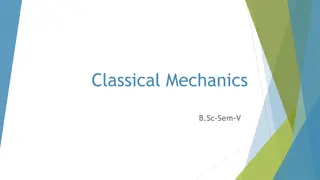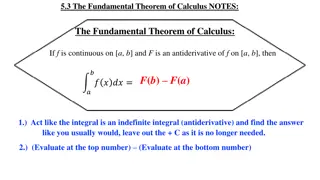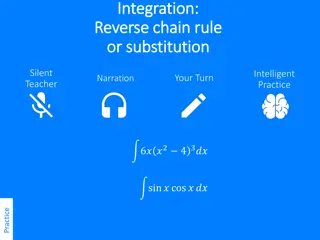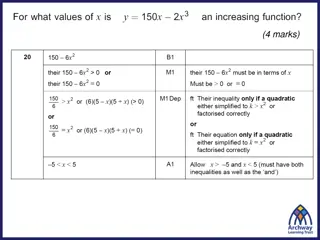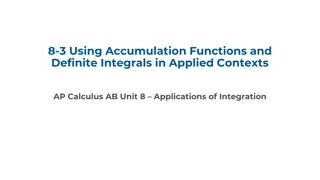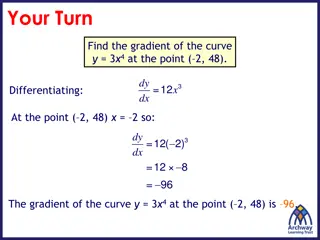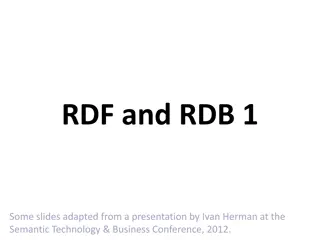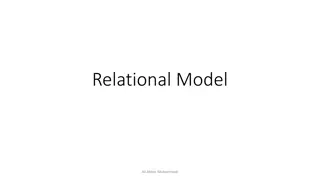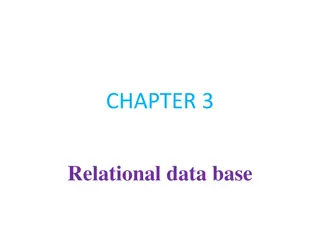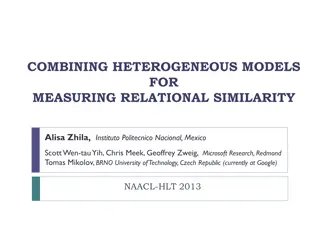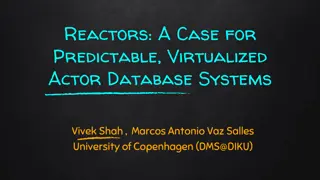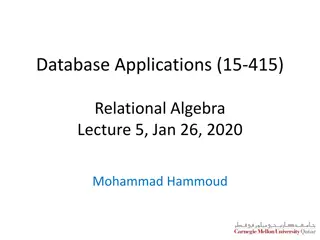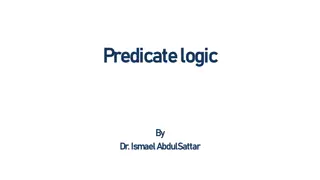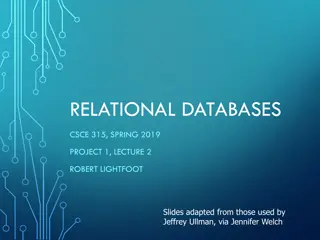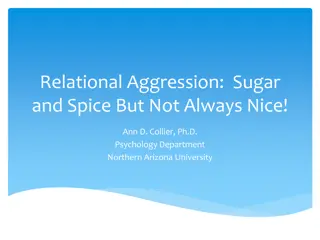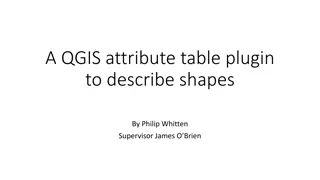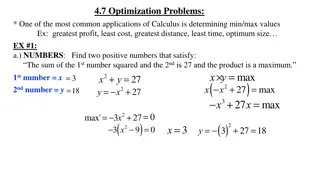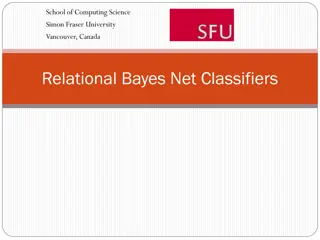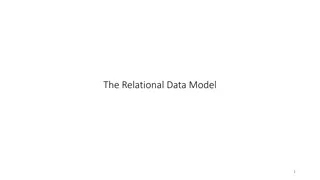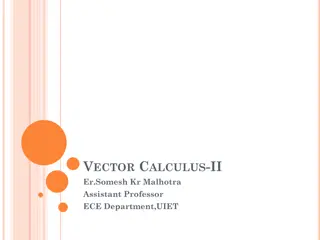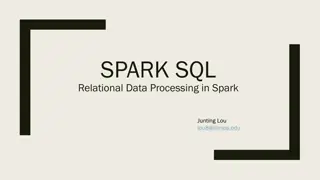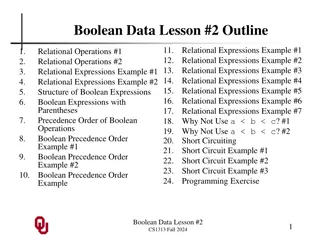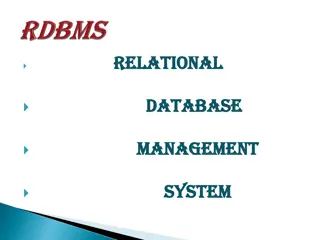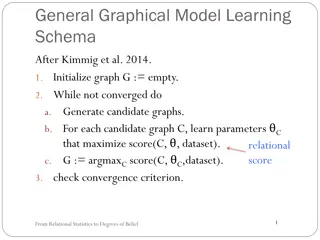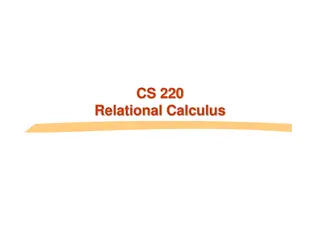Progressive Approach to Relational Entity Resolution
In this research paper authored by Yasser Altowim, Dmitri Kalashnikov, and Sharad Mehrotra, a progressive approach to relational entity resolution is presented. The study focuses on balancing cost and quality in entity resolution tasks for relational datasets. The goal is to develop a method that ac
1 views • 20 slides
Mathematics Course Selection Guide for Fall Semester
Academic advisors Olivia Biehle, Nathaniel Sulapas, and Jennifer McHam at the University of Texas provide guidance on selecting mathematics courses for the fall semester. The guide includes information on course sequences, considerations based on UTMA scores, AP credit recommendations, dual credit o
3 views • 20 slides
Understanding Dental Calculus Formation and Classification
Dental calculus, also known as tartar, is a mineralized bacterial plaque that forms on natural teeth and dental prostheses. It can be classified as supragingival or subgingival based on its relation to the gingival margin. This hard deposit is formed through the mineralization of dental plaque and c
5 views • 36 slides
AQA Level 2 Certificate in Further Maths
The AQA Level 2 Certificate in Further Maths is designed for high-achieving students to develop advanced skills in algebra, geometry, calculus, matrices, trigonometry, functions, and graphs. The course covers topics like number fractions, decimals, algebraic fractions, coordinate geometry, calculus,
7 views • 9 slides
Understanding Integral Calculus: Two Major Approaches & Antiderivatives
In this chapter, we delve into the fundamental concepts of integral calculus, focusing on two major approaches to mathematically generate integrals and assigning physical meanings to them. We explore antiderivatives, differentiation, integration, and the process of taking integration as the inverse
2 views • 59 slides
Understanding Relational Database Design and Mapping Techniques
Explore the process of mapping Entity-Relationship (ER) and Enhanced Entity-Relationship (EER) models to relational databases. Learn about relational model concepts, mapping algorithms, and the goals and steps involved in the mapping process. Discover how to preserve information, maintain constraint
3 views • 42 slides
Understanding Related Rates and Differentials in Calculus
Derivatives involve very small changes in variables, leading to differentials. Related rates in calculus help us find how variables change in relation to each other. Learn how to solve related rates problems step by step with examples involving volumes, radii, and rates of change.
0 views • 11 slides
Understanding Classical Mechanics: Variational Principle and Applications
Classical Mechanics explores the Variational Principle in the calculus of variations, offering a method to determine maximum values of quantities dependent on functions. This principle, rooted in the wave function, aids in finding parameter values such as expectation values independently of the coor
0 views • 16 slides
Understanding the Fundamental Theorem of Calculus
The Fundamental Theorem of Calculus states that if a function is continuous on an interval and has an antiderivative on that interval, then the integral of the function over the interval is equal to the difference of the antiderivative evaluated at the endpoints. This concept is further explored thr
0 views • 14 slides
Integrating Reverse Chain Rule and Substitution in Calculus
Explore the concepts of reverse chain rule and substitution in integration through worked examples and practice questions involving trigonometric functions. Enhance your skills with interactive narration and practical exercises. Dive into the world of calculus with a silent teacher guiding you throu
0 views • 5 slides
Understanding Points of Inflection in Calculus
Points of inflection in calculus refer to points where the curve changes from convex to concave or vice versa. These points are identified by observing changes in the curve's concavity, and they are not always stationary points. A stationary point can be a point of inflection, but not all points of
0 views • 14 slides
Understanding Accumulation Problems and Definite Integrals in Applied Calculus
Explore the interpretation of definite integrals in accumulation problems, where rates of change are accumulated over time. Learn how to solve accumulation problems using definite integrals and avoid common mistakes by understanding when to use initial conditions. Discover the relation between deriv
0 views • 9 slides
Calculus Examples and Practice
Explore various calculus problems involving finding gradients, equations of tangents and normals, and analyzing curves. Practice determining gradients at specific points, solving for coordinates, and differentiating equations to find tangent and normal lines. Understand the relationship between grad
1 views • 11 slides
Understanding Enduring Relational Themes in Psychotherapy
Exploring the concept of Enduring Relational Themes (ERTs) in psychotherapy, this content delves into the history of transference in Gestalt therapy, contemporary psychoanalysis perspectives, forms of transference, and Lynne Jacobs' insights. It highlights how ERTs manifest, their impact on therapy,
5 views • 9 slides
Exporting Relational Data to RDF: Strategies and Considerations
Explore the process of mapping relational data to RDF, including the choice of RDF vocabulary, defining mapping techniques, and exporting strategies. Learn about RDB systems that support RDF, direct mapping approaches, and the use of hybrid storage solutions. Discover how to bridge SPARQL and SQL fo
1 views • 13 slides
Understanding the Key Concepts of Relational Databases
Introduction to the fundamental concepts of relational databases including the relational model proposed by Edgar F. Codd, relation schemes, relation instances, keys for a relation, and more. Discover the significance of keys, candidate keys, superkeys, and primary keys in database design.
0 views • 27 slides
Understanding Relational Databases and File-Based Systems
This chapter delves into the fundamental concepts of databases, comparing them to file-based systems, and highlighting the significance of relational databases in modern integrated AISs. It explores the difference between logical and physical views of databases, introduces key concepts such as DBMS
0 views • 70 slides
Enhancing Relational Similarity Measurements: A Model Combination Approach
This study explores combining heterogeneous models for measuring relational similarity, showcasing the importance of general relational similarity models. It discusses the degrees of relational similarity and introduces a directional similarity model that outperforms previous systems. The approach l
0 views • 23 slides
Reactor: A Case for Predictable, Virtualized Actor Database Systems
Exploring the integration of actor programming models in modern relational databases to achieve high performance. The focus is on addressing challenges related to stored procedures, data partitioning, modularity, isolation, software engineering, and performance. The talk outlines motivation, the rel
0 views • 41 slides
Understanding Relational Query Languages in Database Applications
In this lecture, Mohammad Hammoud discusses the importance of relational query languages (QLs) in manipulating and retrieving data in databases. He covers the strong formal foundation of QLs, their distinction from programming languages, and their effectiveness for accessing large datasets. The sess
0 views • 39 slides
Understanding Predicate Calculus: Symbols, Terms, and Variables
Predicate calculus extends propositional calculus by introducing symbols like truth values, constants, variables, and functions. It allows for precise manipulation of components within assertions, enabling the creation of general statements about classes of entities. Learn how predicates define rela
1 views • 14 slides
Challenges and Innovations in Relational Engine Algorithms
Exploring the complexity of processing graph data in relational query engines, this content delves into the challenges faced, practices adopted in academia, and innovative solutions like LMS-NPRR, trie join, and specialized data structures. It discusses the difficulties in handling acyclic vs. cycli
0 views • 27 slides
Understanding Relational Evangelism and Sharing Your Faith Testimony
Discover the essence of relational evangelism and effectively articulating your testimony of faith. Explore the significance of the Gospel message and different evangelistic approaches while delving into the concept of personal evangelism without imposition. Embrace the idea of faith arising in vari
0 views • 32 slides
Fundamentals of Relational Databases in CSCE 315 - Lecture Highlights
Introduction to relational databases covering topics such as relational data model, schemas, converting from entity-relationship model, entity sets, relations, relationships, combining relations, and practical examples. Learn about storing data in tables, attributes, database organization, and the i
1 views • 18 slides
Understanding Relational Aggression in Girls: The Impact on Social Relationships
Relational aggression, a form of social bullying, can have detrimental effects on girls' social relationships and self-esteem. This type of indirect aggression includes behaviors like exclusion, spreading rumors, and social manipulation. Understanding and assessing relational aggression is crucial f
0 views • 22 slides
Enhancing Spatial Data Analysis in QGIS
Explore the integration of relational databases with QGIS to facilitate efficient spatial data analysis. Discover the importance of recognizing spatial relationships within data sets and the solutions to enhance QGIS for relational datasets. Overcome challenges and delve into the intersection and su
0 views • 25 slides
Applications of Calculus in Optimization Problems
Calculus plays a crucial role in solving optimization problems to find maximum or minimum values in various real-life scenarios. This content provides examples of optimizing for maximum profit, area, distance, and volume using calculus concepts. From finding optimal dimensions for fencing to maximiz
0 views • 10 slides
Understanding Relational Bayesian Networks in Statistical Inference
Relational Bayesian networks play a crucial role in predicting ground facts and frequencies in complex relational data. Through first-order and ground probabilities, these networks provide insights into individual cases and categories. Learning Bayesian networks for such data involves exploring diff
0 views • 46 slides
Understanding Calculus: From MVT to FTC with Lin McMullin
Join Lin McMullin in exploring the transition from the Mean Value Theorem (MVT) to the Fundamental Theorem of Calculus (FTC). Discover the significance of MVT, Fermat's Theorem, Rolle's Theorem, and the Mean Value Theorem, all crucial concepts in calculus. Engage in graphical explorations, proving m
0 views • 45 slides
Understanding the Fundamental Theorem of Calculus
Explore the connection between differential calculus and the definite integral through the fundamental theorem of calculus, which allows for the evaluation of complex summations. Discover the properties of definite integrals and how to apply the theorem to find areas under curves. Practice evaluatin
0 views • 15 slides
Datalog Revival and Limitation of Relational Calculus
Datalog, a logic-based programming language, saw a revival in the 21st century with the addition of recursion to positive first-order queries. The history of Datalog traces back to the 1970s with the idea of adding recursion to FO queries. Despite the industry's initial lack of interest, Datalog fou
0 views • 45 slides
Understanding the Relational Data Model and Database Concepts
Delve into the world of relational data modeling, database integrity rules, and structure. Explore how a university database in MS Access utilizes relational tables and fields to store information. Learn about the key terminology associated with relational databases, such as primary keys, foreign ke
0 views • 69 slides
Women's Self-Esteem and Relationship Behavior Study: Insights and Implications
This study explores the relationship between women's self-esteem, relational behavior, and perceptions of relational desirability. Findings indicate that self-esteem does not significantly predict relational behavior, with women feeling less desirable than their partners reported investing more in r
0 views • 9 slides
Understanding Relational Child and Adolescent Psychotherapy
Explore the concepts of relational child and adolescent psychotherapy involving attachment patterns, intersubjectivity, corrective emotional experiences, and the role of the relational psychodynamic psychotherapist in providing corrective emotional experiences essential for the child's development.
0 views • 25 slides
Understanding Vector Calculus II Concepts with Examples by Prof. Somesh Kr. Malhotra
Explore advanced topics in vector calculus including gradient, divergence, curl, and theorems like the Divergence Theorem and Stokes' Theorem. Follow along with examples presented in Cartesian, spherical, and cylindrical coordinates to deepen your understanding of vector calculus concepts.
0 views • 29 slides
Overview of Spark SQL: A Revolutionary Approach to Relational Data Processing
Spark SQL revolutionized relational data processing by tightly integrating relational and procedural paradigms through its declarative DataFrame API. It introduced the Catalyst optimizer, making it easier to add data sources and optimization rules. Previous attempts with MapReduce, Pig, Hive, and Dr
0 views • 29 slides
Understanding Relational Operations for Boolean Expressions
Learn about relational operations in Boolean expressions through examples and explanations. Discover how to compare numeric operands to produce Boolean results, covering equal to, not equal to, less than, less than or equal to, greater than, and greater than or equal to operations. The content inclu
0 views • 25 slides
Evolution of Database Management Systems
The evolution of Database Management Systems (DBMS) began with file systems and punched cards in the 1950s, followed by hierarchical and network models in the 1960s and 1970s. The 1980s introduced relational databases like Ingres, Oracle, DB2, and Sybase. The 1990s saw the rise of object-oriented an
0 views • 31 slides
Learning Bayesian Network Models from Complex Relational Data
Delve into the process of learning Bayesian network models from complex relational data, extending traditional algorithms to suit relational data structures. Explore key concepts like likelihood functions, graphical model initialization, and parameter learning for effective model fitting.
0 views • 20 slides
Introduction to Relational Calculus and Algebra in Database Management
Explore the fundamental concepts of relational calculus and algebra in the domain of database management. Understand the differences between declarative and imperative query languages and learn to retrieve information using practical examples and theoretical frameworks such as tuple relational calcu
0 views • 23 slides





